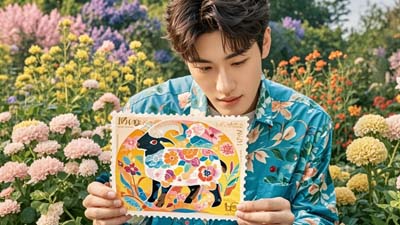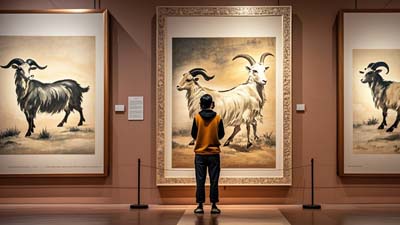
“羊(yáng)” is zodiac animal of this Chinese Lunar New Year, but it has caused a good deal of confusion in the English-speaking world, because its translation results in at least three candidates: ram, sheep and goat. Unlike China, other countries in Asia are more settled on the question of which kind of “羊(yáng)” is the right one. For example, Vietnamese use “goat,” Koreans “ram,” and Japanese “sheep.” So how about China? Is it a ram, sheep, or goat?
To get to the bottom of it, let’s have a closer look at the traditional meaning of “羊(yáng)” in Chinese culture!
The word “羊(yáng)” is the same as “祥(xiáng)” in ancient Chinese, so the phrase “大吉羊(dàjíyáng) the big auspicious ram, sheep or goat” equates to “大吉祥(dàjíxiáng) great auspiciousness.” Therefore, “羊(yáng)” often symbolizes good luck and auspiciousness. “羊(yáng)” are animals that are known to be meek, gentle, and affectionate. Having a long history of domestication in China, they have become adorable companions to the Chinese since ancient times.
The character “美(měi) beauty,” when etched on oracle bone scripts, appears with two “horns” similar to those of “羊(yáng)” on the top as a sign of goodness. What’s more, since the meek image of the animal “羊(yáng)” is matched with traditional Chinese virtues like gentleness, kindness and obedience, the word “羊(yáng)” carries cultural meanings of “善(shàn) kindness,” “义(yì) loyalty,” and “美(měi) beauty.” Comparing a person to a “羊(yáng)” means that he or she is characterized as being “仁(rén) benevolent,” “义(yì) loyal,” and “德(dé) virtuous.”
The Chinese classic, Three Character Classic, addresses the animal’s filial piety as, “羊初生, 知跪乳(yángchūshēng, zhīguìrǔ) to show its gratitude, the lamb kneels down before its mother to drink her milk.”
Tā xìnggé wēnshùn shànliáng, jiùxiàng yìzhī xiǎomiányáng.
她 性格 温顺 善良, 就像 一只 小绵羊。
She is as gentle and kind as a sheep.
Yáng yǒu guìrǔzhī’ēn, rén yěyào dǒngdé zhī‘ēntúbào.
羊 有 跪乳之恩,人 也要 懂得 知恩图报。
To show their gratitude, lambs kneel down to drink milk, so people should also learn to be grateful.
In ancient Chinese scripts, “羊(yáng)” equates to “阳(yáng),” so paintings with three “羊(yáng)” together looking up at the sun symbolizes “三阳开泰(sānyángkāitài),” meaning, when winter gives place to spring with Yin declining while Yang is growing, everything takes on a completely new look. Nowadays, many New Year’s blessings also originate from the homophony of “羊(yáng),” such as “喜气洋洋(xǐqìyángyáng) be bursting with happiness,” “洋洋得意(yángyángdéyì) be extremely proud of one’s achievement,” “扬眉吐气(yángméitǔqì) to feel proud and elated,” etc.
Yángnián dàole, zhù nín zài xīnde yìniánlǐ jíxiángrúyì, xǐqìyángyáng!
羊年 到了,祝 您 在 新的 一年里 吉祥如意, 喜气洋洋!
With the Year of Goat coming, I wish you good luck and happiness in the New Year.
Wǒ gěi shūshu fāle yígè 8.88 yuánde wēixìn hóngbāo, zhù tā jīnnián zài shēngyìchǎng shàng yángyángdéyì!
我 给 叔叔 发了 一个 8.88 元的 微信 红包, 祝 他 今年 在 生意场 上 洋洋得意!
I gave my uncle 8.88 yuan worth of WeChat Lucky Money and wished him great success in his business this year!
Wǒ yào nǔlì xuéxí, kǎoshàng míngpái dàxué, ràng bàmā yángméitǔqì.
我 要 努力 学习, 考上 名牌 大学,让 爸妈 扬眉吐气。
I have to study hard and get into a famous university to make my parents proud of me.
As for the “羊(yáng)” in the twelve Chinese zodiac animals, is it a ram, sheep or goat? Some folklore experts argue that there is no historical definition of this zodiac animal, so ram, sheep and goat are all correct answers, but cultural connotations should be taken into consideration when translating.
Although there still remains ambiguity on the right animal, there is no doubt that the Year of the “羊(yáng)” symbolizes a year of peace, auspiciousness and success. Some people may prefer to go with the “goat” because it is a more common type of livestock. Meanwhile, others may choose “sheep,” which continues to produce wool every year, thus symbolizing profits pouring in from all sides.
In the end, no matter which kind of “羊(yáng)” is used, the word carries auspicious meanings for the Chinese.
Liú Jiā: Wáng lǎobǎn, zhù nín yángnián shēngyixīnglóng, jíxiángrúyì!
刘 佳: 王老板, 祝 您 羊年 生意兴隆, 吉祥如意!
Liu Jia: Mr. Wang, I wish your business success, and may everything go well for you in the Year of the Goat!
Wáng lǎobǎn: Xièxiè! Yě zhù nín yángniándàjí, xǐqìyángyáng.
王老板: 谢谢!也 祝 您 羊年大吉, 喜气洋洋。
Mr. Wang: Thanks a lot! I hope you have a lucky and happy Year of Goat!

1. According to the Chinese, all of the following are characteristics of the animal “羊(yáng)” except _____?
A. Gentle.
B. Diligent.
C. Benevolent
2. What does “三阳开泰(sānyángkāitài)” mean?
A. When winter gives place to spring with Yin declining while Yang is growing, everything takes on a completely new look.
B. When winter gives place to spring with Yin declining while Yang is growing, everything will go well in the new year.
C. When winter gives place to spring with Yin declining while Yang is growing, everyone will make great progresses in the new year.
3. If your friend wishes you “喜气洋洋(xǐqìyángyáng)” in the new year, what does he or she mean?
A. Wish you a prosperous New Year.
B. May all your wishes come true.
C. Wish you happiness in the coming year.
Chinese Culture
General Chinese (Beginner Level)
General Chinese (Intermediate Level)



